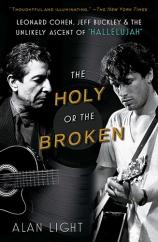The Holy or the Broken: Leonard Cohen, Jeff Buckley, and the Unlikely Ascent of "Hallelujah"
Review
The Holy or the Broken: Leonard Cohen, Jeff Buckley, and the Unlikely Ascent of "Hallelujah"
In THE HOLY OR THE BROKEN, Alan Light almost insists that the reader know more than one version of Leonard Cohen’s song, “Hallelujah.” He conducts a wide-ranging study of first the song itself, including many, many verses and their Biblical and secular origins, and then the story of Jeff Buckley, whose recording was hugely instrumental in the eventual mega-success of the song. The accounts of the more than 200 recordings, artists and uses of the song follow in fascinating stories.
Leonard Cohen has been a figure on the international music scene for decades, and his gravelly voice and sometimes suggestive, always evocative lyrics are his trademark. Light’s introduction shows Cohen accepting an award for “Song Lyrics of Literary Excellence” earlier this year in Boston. Bob Dylan sends a congratulatory email addressing him as the “Kafka of the Blues,” and the fun begins of sorting out how “Hallelujah” went from being on the single album that was refused by Cohen’s record company to winning this prestigious honor from PEN New England.
The opening verse of “Hallelujah” (musicians have been known to rearrange the order, to omit verses, or even stop in the middle) starts with an image of King David’s “secret chord” with its special spiritual power. It was his noted musicianship that first earned David a spot in the royal court, the first step toward his rise to power and uniting the Jewish people. David’s longing for Bathsheba “overthrew” him. The greatness of Samson (“She tied you to a kitchen chair / she broke your throne, she cut your hair” in the second verse) and the power of David are no longer viable; these Old Testament icons are helpless in lust and despair. “They find themselves in a stark and barren place” with only a broken or a holy “Hallelujah.”
"With “Hallelujah,” the fear is that you’ll lose the power of the music trying to remember what it is exactly about each verse you love. However, Light’s explanation of word choices is richly helpful and persuades multiple listenings from multiple musicians."
This verse continues with the lines “It goes like this: the fourth, the fifth / the minor fall, the major lift,” a bit of music theory for non-musical folks. k. d. lang’s version makes this information absolutely imperative.
Speaking of the verses in order, or speaking of the words in a particular phrase, is pointless; the song is as versatile as the artists who chose to sing it. The variety of rhymes with “hallelujah” include “you don’t really care for music, do you?’” and “moonlight overthrew you” to the darker “shoot at someone who outdrew you.” In his tribute to Cohen in Boston, Salman Rushdie grins as he compares “what’s it to ya” as equally non-sacred.
There’s always a pleasant danger in knowing too much about any one thing. With “Hallelujah,” the fear is that you’ll lose the power of the music trying to remember what it is exactly about each verse you love. However, Light’s explanation of word choices is richly helpful and persuades multiple listenings from multiple musicians.
In John Cale’s 1991 album I’m Your Fan, the stripped-down presentation “humanized the song, arguably flattening out the emotional ambiguity…but retain[ing] the mystery and majesty of its imagery.” Amanda Palmer, as others do, believes Cale’s editing and “restructuring truly cracked the code of the song,” leading to the explosive success that would follow. Cale’s version was the one Jeff Buckley heard first, and Buckley would change the course of the song’s history.
Light’s history of Buckley and his recording of “Hallelujah” follows the young singer’s life and his happening upon the song. His interpretation is intimate, personal and youthful; he was exactly half Cohen’s age at the time each recorded the song, so what they had learned added up to a very different set of lessons. He polishes the song, and it connects with different, younger listeners. His Grace album came out in 1994, and it was uneven and unsuccessful. However, after Buckley’s too-early and tragic death, “Hallelujah” became an “insider’s secret” among his following and served as his elegy.
On September 12, 2001, Buckley’s version of “Hallelujah” became the backdrop for VH1’s footage of the rubble and panic of the smoking World Trade Center. The song captured the loss and anguish, confusion and despair of a nation. It had become a spiritual.
Light’s book fills in the spaces of years with details of how “Hallelujah” was used in television, movies and music studios. He quotes the famous; my favorite is Bono’s comment about the title itself: “Praising God, Yah, Yahweh --- it’s a very powerful word, a big idea, and I’ve hung on to it very tightly over the years.”
Finally, though, nothing trumps a snowy Sunday afternoon tracking down and listening to recordings of “Hallelujah” for the pleasure of hearing them again or for the first time just to see. Or looking at the finale of season three of “The O.C.”when Marissa dies or catching the Shrek moment when he is contemplating his loneliness. Or Googling the k. d. lang version for the 2010 Olympics opening and stopping, in absolute joy. Or even, after reading Bon Jovi’s apology for his adaptation of the song, finding it and realizing he was damn right.
Renée Fleming puts it well: “Halleljuah” has blossomed into a “kind of Rorschach test…because everyone has a different reaction to it.” And we each own it.
Reviewed by Jane Krebs on January 4, 2013
The Holy or the Broken: Leonard Cohen, Jeff Buckley, and the Unlikely Ascent of "Hallelujah"
- Publication Date: November 19, 2013
- Genres: Entertainment, Music, Nonfiction
- Paperback: 288 pages
- Publisher: Atria Books
- ISBN-10: 1451657854
- ISBN-13: 9781451657852











